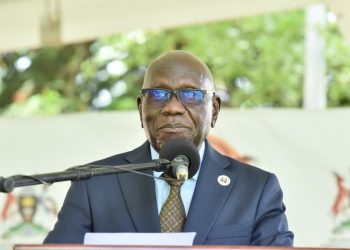By John V Sserwaniko
Mulengera news has finally spoken to Finance Minister Matia Kasaija who has confirmed our earlier story regarding President Museveni’s wish to use the NSSF money to accomplish the construction of the JLOS House in Naguru. This news website exclusively ran the story this morning and it was without Kasaijja’s input having failed to get him earlier. On reading our first story (entitled M7 USES NSSF CASH TO BUILD JUDICIARY H’SE AS KATUREEBE BLOWS 10BN ON RENT), the finance minister got on phone and spoke to us sharing facts in his possession regarding the same matter. To be situated in Naguru near police headquarters, the JLOS House will accommodate key offices of the Judiciary, Police, Prisons, DPP, NIRA and other Justice Law & Order Sector (JLOS) institutions. Its accomplishment has been long overdue because of financial constraints prompting President Museveni to direct Finance Ministry technocrats to study and advise him on the suitability of using NSSF money. “What’s wrong with that? Don’t we all know that the NSSF has the money and plenty of it?” Kasaija said in a phone interaction with this news website. He confirmed the authenticity of our story and submitted as follows: “I can confirm that it’s an idea that has come up in some meeting [with the President] and I need to cross check and tell you how far we have gone with it. Being the Finance Minister, I’m always very busy as you know and therefore I need to be updated to know how far we have gone with that idea.” He added: “Yes we have discussed with H.E. [the President] and it’s one of the many options at the table but I need to check with my people to tell you how far we have gone.” Kasaijja said besides fundraising that way to accomplish the much-delayed JLOS House, many other options are on the table including generous contributions “being expected from some foreigners who want to help us on that.” He said the project is already work in progress and the NSSF money “will only be complimenting on other sources.”

HOW IT WORKS: Matters to do with touching NSSF money have always sparked anxiety since the Shs8.7trillion the Fund currently has isn’t for government but for workers/savers that make monthly contributions of 15% off their salary. This nervousness amongst NSSF members has always been anchored on what has happened before whereby investment in such large infrastructure projects has always been shrouded in corruption and controversy often sparking parliament’s intervention. One of the very knowledgeable pundits we spoke to for this article said: “That is okay because it’s ideally what Pension Funds do all over the world. They are used to develop their countries and reduce reliance on foreign funding. But in our case what must concern workers is ensuring that there is good return on investment as well as transparency in the way the funds are remitted for that JLOS project and recovery because that is where corruption comes in sometimes. We basically must demand transparency and accountability but otherwise there is nothing sinister about the President’s suggestion because globally Pension Funds are used that way.” This pundit, who declined being named so as to freely discuss the matter without fear for reprisals, said this would be an opportunity for the country to deepen the application of the newly enacted PPP Act. “I see that as a perfect opportunity to harness the PPP approach because since its enactment, major PPP projects have occurred only in Energy sector where government has partnered with private sector to construct small dam projects,” the pundit further explained. President Museveni, backed by some Finance Ministry officials, feels that NSSF’s Shs8.7trn (which has been realized largely because of improved compliance & good return earned from fixed income being invested in the bond sector) offers government the best opportunity to expeditiously construct the JLOS House without having to go begging foreigners/donors to come to our rescue. As provided for under the URBRA Act, it would only take government floating a pre-fixed bond in which NSSF invests and the money would be availed to accomplish the JLOS House project. Whereas the URBRA Act allows NSSF to invest up to 70% of the Shs8.7tn it currently has (in bonds & fixed deposits), the Fund has so far invested up to Shs690bn in government bonds. This simply means much more can still be lent to government within that ceiling.
































